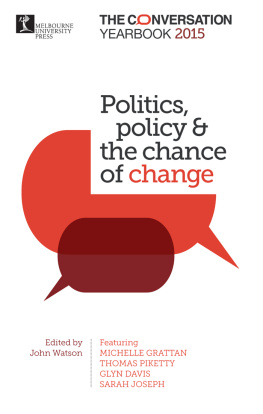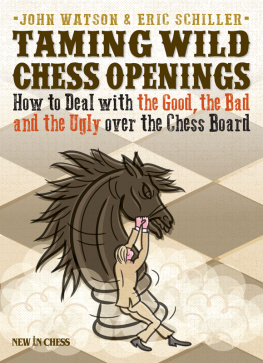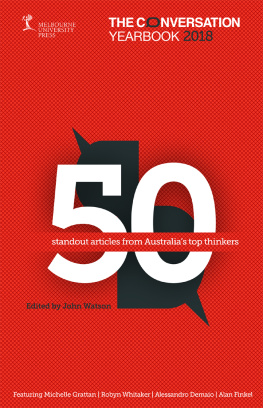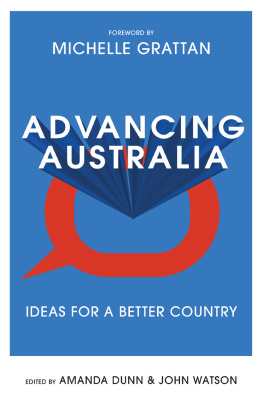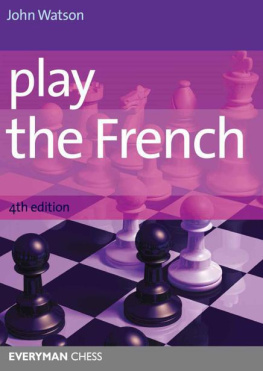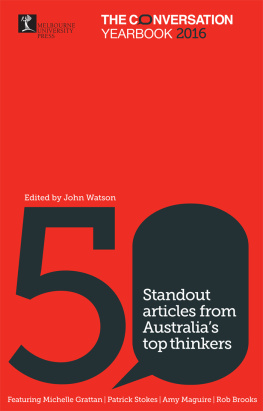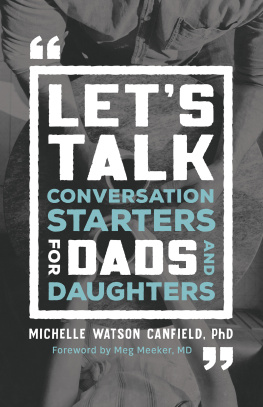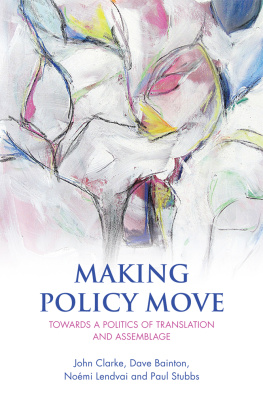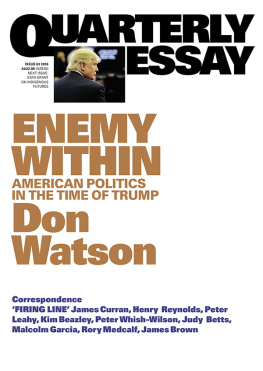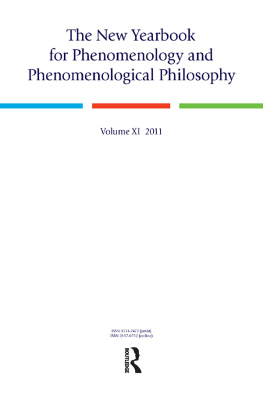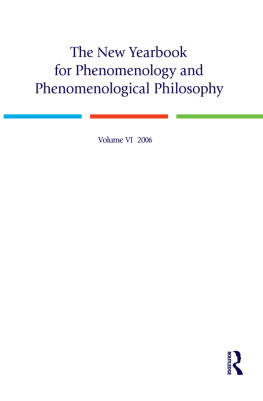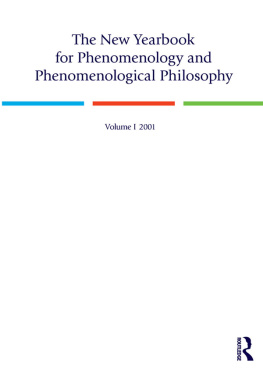MELBOURNE UNIVERSITY PRESS
An imprint of Melbourne University Publishing Limited
1115 Argyle Place South, Carlton, Victoria 3053, Australia
www.mup.com.au
First published 2015
Text 2015 remains with the identified original authors
Design and typography Melbourne University Publishing Limited, 2015
This book is copyright. Apart from any use permitted under the Copyright Act 1968 and subsequent amendments, no part may be reproduced, stored in a retrieval system or transmitted by any means or process whatsoever without the prior written permission of the publishers.
Every attempt has been made to locate the copyright holders for material quoted in this book. Any person or organisation that may have been overlooked or misattributed may contact the publisher.
Text design and typesetting by Typeskill
Cover design by Mary Callahan Design
Printed in Australia by McPhersons Printing Group
National Library of Australia Cataloguing-in-Publication entry
Politics, policy and the chance of change: the
conversation yearbook 2015/edited by
John Watson.
9780522869811 (paperback)
9780522869828 (ebook)
History, Modern21st century.
AustraliaPolitics and government21st century.
AustraliaHistory21st century.
Other Creators/Contributors:
Watson, John, editor.
320.994
CONTENTS
Michelle Grattan, University of Canberra
Shaun Carney, Monash University
Barry Jones, University of Melbourne
Dennis Altman, La Trobe University
Geoffrey Robinson, Deakin University
Carol Johnson, University of Adelaide
Tony Kevin, Australian National University
Glyn Davis, University of Melbourne
Gavin Moodie, RMIT University
John Rice, University of New England
Hannah Forsyth, Australian Catholic University
Stephen King, Monash University
Helen Hodgson, Curtin University
Jeffrey Wilson, Murdoch University
Mirko Bagaric, Deakin University
Stephen Duckett and Peter Breadon, Grattan Institute
Lesley Russell, University of Sydney
Anne-marie Boxall, University of Sydney
Karyn Healy, The University of Queensland
Narcyz Ghinea, Ian Kerridge and Wendy Lipworth, University of Sydney
Mark Lawrence, Deakin University, and Christina Pollard, Curtin University
Wesley Widmaier, Griffith University
Remy Davison, Monash University
Joshua Healy, University of Melbourne
David Tuffley, Griffith University
Les Field, UNSW Australia
Amy Auster, Australian Centre for Financial Studies
Fabrizio Carmignani, Griffith University
John Woinarski and Stephen Garnett, Charles Darwin University
Samuel Alexander, University of Melbourne
Lars Bejder, Murdoch University; Ari Friedlaender, Oregon State University; David Johnston, Duke University; and Joshua Smith, Murdoch University
John Mathews, Macquarie University
Ove Hoegh-Guldberg, The University of Queensland
Douglas Bardsley, University of Adelaide
Nick Rowley, University of Sydney
Alan Finkel, Monash University
Michael J.I. Brown, Monash University
Toby Walsh, NICTA
Sarah Loughran, University of Wollongong
Michael Vagg, Deakin University
Emily Petroff, Swinburne University of Technology
Jonti Horner, University of Southern Queensland, and Jonathan P. Marshall, UNSW Australia
Meg Smith, Western Sydney University
Lisa A. Williams, UNSW Australia
Michelle Arrow, Macquarie University
Kristin Diemer, University of Melbourne
Stewart Riddle, University of Southern Queensland
Michael Westaway, Griffith University, and Joe Dortch, University of Western Australia
Clive Hamilton, Charles Sturt University
Emma Thomas and Anne Pedersen, Murdoch University
Catriona Elder, University of Sydney
David Pledger, RMIT University
Ben Eltham and Deb Verhoeven, Deakin University
Stuart Glover, The University of Queensland
Julian Meyrick, Flinders University
Jason Potts, RMIT University
Jill Gould, University of South Australia
Peter Cochrane, University of Sydney
Sarah Joseph, Monash University
Russell Blackford, University of Newcastle
Saleem H. Ali, The University of Queensland
Tim Lindsey, University of Melbourne
Amy Maguire, University of Newcastle
Patrick Stokes, Deakin University
John Barry, Queens University, Belfast
Alexander Betts, University of Oxford
Yohanes Sulaiman, Indonesian Defence University
Don K. Marut, Bina Nusantara University
Folasade Ogunsola, University of Lagos
Mashupye Herbert Maserumule, Tshwane University of Technology
John Donohue, Stanford University
Nader Habibi, Brandeis University
Thomas Piketty, Paris School of Economics
Foreword
Has a year of political turmoil changed the game?
Michelle Grattan
Chief Political Correspondent, The Conversation, and Professorial Fellow, University of Canberra
In 2015, Australian federal politics saw another of the volcanic leadership eruptions that marked 2010 and 2013. This time on the conservative side, it showed that the impact of polling on the behaviour of MPs is bipartisan.
Many in the public hope Malcolm Turnbulls ascension will be a circuit-breaker, starting a more positive period in federal politicsa break from the negativity, nastiness and cannibalising of prime ministers by their own parties that has blighted the recent past and further alienated a cynical public.
There was already a model for a better way, and a lesson. Early in 2015, the pugilistic Campbell Newman lost the Queensland state election, despite having had a huge majority. In contrast, New South Wales Premier Mike Baird, politically a lover rather than a fighter, held power handsomely.
The federal Liberals had vowed they would not be like Labor in ditching their prime minister in his first term. Yet Tony Abbott, despite his sweeping victory, lasted a mere two years.
When Abbott was deposed in September on a party-room vote of 5444, Australia got not just a new leader but a changed style of government and, in the electorate, a mood of relief.
Abbott led an aggressive, divisive administration, which forfeited trust and angered voters. Turnbull arrived talking consensus and co-operation, reaching out to community and crossbenchers.
Abbott saw the dark side in many things; he continued in government the politics of opposition; he hunted his opponents continually and relentlessly even (through royal commissions) when he had already vanquished them. National security, with constant warnings of the threat from the Islamic State death cult, was used as a weapon of political protection and an attempted wedge against Labor.
The culture wars took the form of a virulent government onslaught against the ABC. A bevy of right-wing media commentators egged on the attacks against this and other targets. After Abbott fell, in a coup he did not see coming, some among these supporters descended into a funk of fury.



